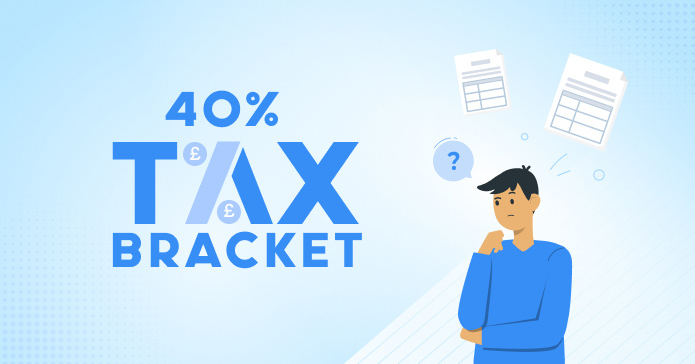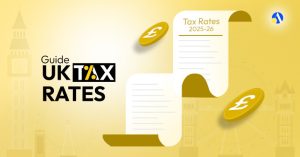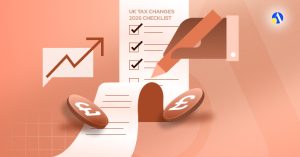What is the Tax Brackets in the UK - 2023?
In the United Kingdom, tax rates are based on income levels and are divided into different brackets. The 40% tax bracket is one of the highest tax brackets in the UK, with a higher tax rate applicable to anyone earning more than £50,270 as of 2023.
Personal Allowance covers earnings up to £12,570
Basic Tax Rate is earnings between £12,571 and £50,270
Higher Tax Rate is earnings between £50,271 and £125,140
Additional Tax Rate is earnings over £125,141.
In this blog post, we`ll cover the implications of a Higher Tax Rate, a basic understanding of the 40 tax bracket and how to reduce your tax bill if you are subjected to the 40 tax threshold.
How does the 40% Tax Bracket Work?
If your annual earnings fall within the 40% tax bracket, you will only be taxed on the margin of your earnings that exceeds the £50,270 threshold. In other words, if your annual income is £70,000, you will only pay 40% tax on the amount over £50,270. This means that your total taxable income would be £19,730 (£70K - £50,270) and not the entire £70,000.
How to Reduce Your Tax Bill in the 40% Tax Bracket?
Being subjected to the 40% tax bracket can result in a higher tax bill. However, there are ways you can avoid the 40% tax bracket and keep more of your hard-earned money.
- Making Tax-free investments: One way to reduce your tax bill is by investing in schemes that offer tax-free allowances, such as Individual Savings Accounts (ISA) or pension contributions. By taking advantage of these investments, you can lower your taxable income and potentially move down to a lower tax bracket. Try to make sure you inform HMRC so that they`ll change your Tax Code, for more information about it please take a look at our comprehensive blog on tax codes
- Claiming Tax Reliefs: You may also be eligible for certain tax reliefs, such as charitable donations, that can lower your taxable income and reduce your tax bill. It is important you know how to claim tax relief whilst working from home
- Salary Sacrifice: Another option is to participate in salary sacrifice schemes offered by your employer. This involves sacrificing a portion of your pre-tax salary towards benefits like childcare vouchers or cycle-to-work schemes, reducing your taxable income.
- Pension contributions: Contributing to a pension can also be an effective way to reduce your tax bill in the 40% tax bracket. Your pension contributions are not subject to income tax, reducing your taxable income and potentially moving you down to a lower tax bracket.
- Utilizing Tax Deductions: You may also be able to claim certain tax deductions, such as work-related expenses or rental property expenses if you have a buy-to-let property. These can lower your taxable income and reduce your overall tax bill.
Is it the same for Scottish taxpayers?
Starter Rate: Applies to earnings between £12,571 and £14,667 with a tax rate of 19%.
Basic Rate: Applies to earnings between £14,668 and £25,296 with a tax rate of 20%.
Intermediate Rate: Applies to earnings between £25,297 and £43,662 with a tax rate of 21%.
Higher Rate: Applies to earnings between £43,663 and £150,000 with a tax rate of 41%.
Top Rate: Applies to earnings over £150,000 with a tax rate of 46%.
Is 40% Tax Bracket Ever Going To Change?
Tax brackets are subject to change and are often adjusted by the government in line with economic conditions. It is important to stay informed about any changes that may affect your tax bracket.
40 tax bracket, however, is frozen until 2028, so unless there is a major tax adjustment in 5 years ahead, %40 tax threshold is here to stay.
Conclusion
In summary, the 40% tax bracket is one of the highest tax brackets in the UK, applicable to anyone earning more than £50,270 as of 2023. If you fall within this tax bracket, your income above £50,270 will be taxed at a rate of 40%. However, there are ways to reduce your tax bill if you are subjected to the higher tax rate, such as making tax-free investments, claiming tax reliefs and utilizing salary sacrifice schemes. It is also important to stay informed about any changes to tax brackets that may affect you in the future. So if your income puts you in this bracket, be sure to explore these options and consult with a financial advisor for personalized advice on how to reduce your tax bill. After all, every little bit of savings counts when it comes to taxes! So don't miss out on any potential ways to lower your taxable income and keep more of your hard-earned money in your pocket.














